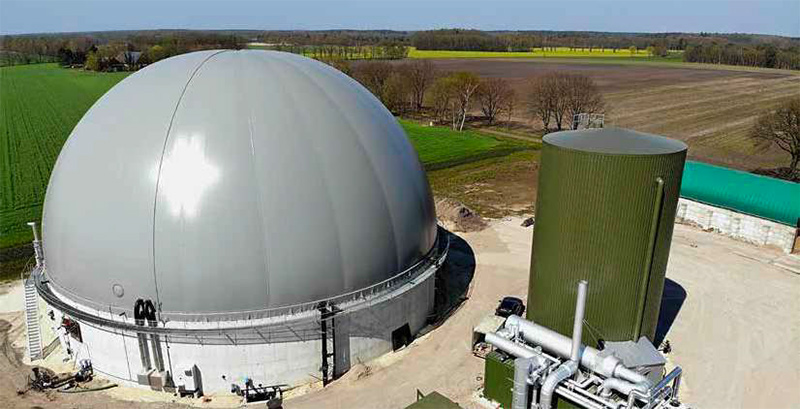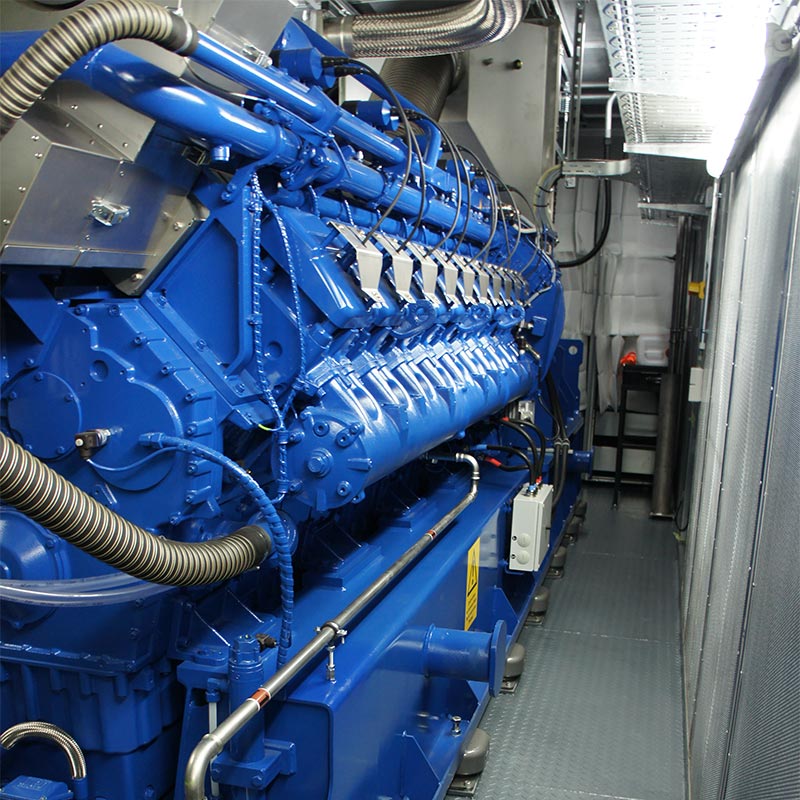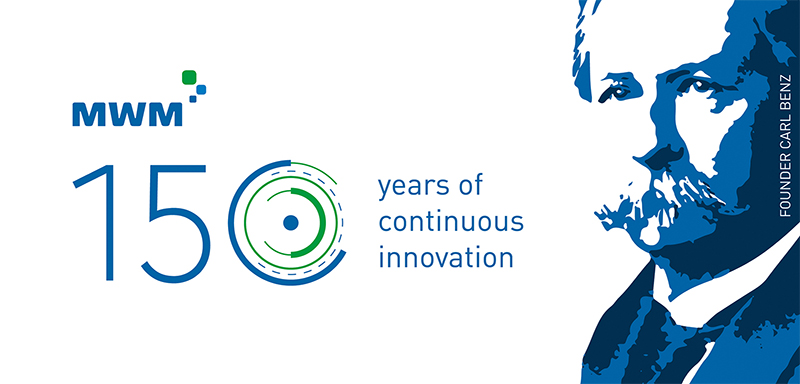MWM Flex Cogeneration Power Plant for Biogas Plant in Lower Saxony Designated “Cogeneration Power Plant of the Month” of January
Mannheim, January 30, 2020
“Energie & Management” magazine has designated a biogas plant in Lower Saxony, which has been expanded and flexibilized with an MWM gas engine, as “Cogeneration Power Plant of the Month” of January. The energy project was rolled out by Energethik Ingenieurgesellschaft mbH, Osnabrück. Operating in flexible mode, the cogeneration power plant is used to supply a local heat network and an industrial wood drying plant with heat. The regenerative storage power plant went live in January 2019.

The regenerative storage power plant of Rohlfs Biogas KG with flexible operating cogeneration power plant, heat storage unit and gas storage unit. (Photo: Energethik Ingenieurgesellschaft mbH)
MWM Gas Engine Generates Electrical Energy and Heat for Building Heating and Wood Drying
To expand and flexibilize the biogas plant of Rohlfs Biogas KG in Wehrbleck, Lower Saxony, an MWM TCG 2020 V20 biogas engine with an output of 2 MWel and 2.3 MWth was installed. The engine is to generate about 5.7 million kWh of electrical energy and 5.8 million kWh of heat a year. The heat is fed into the local network for heating municipal and residential buildings as well as for an industrial wood drying plant. The drying process increases the heating value and storability of the wood chips.
The container module was built by the long-standing MWM partner ETW Energietechnik GmbH. In view of its compact dimensions, low maintenance costs, and high ramp-up reliability, Marco Weiss, Managing Director, considers the TCG 2020 V20 gas genset to be an ideal biogas flex engine. As the exhaust gas is only cooled to 80°C at Mr. Rohlfs’ biogas plant, the plant’s total efficiency reaches an excellent value of 91.3 percent.

In view of its compact dimensions, low maintenance costs, and high ramp-up reliability, the MWM TCG 2020 V20 gas engine is considered to be an ideal biogas flex engine. (Photo: ETW Energietechnik GmbH)
Demand-Controlled Cogeneration Power Plant Operation Thanks to Flexibilization
The plant’s older cogeneration power plants serve fallback purposes and provide control energy. A combined gas storage unit with a capacity of 8,490 m3 and a heat storage unit with a capacity of 1,000 m3 make the biogas plant flexible. The heat storage unit is capable of storing 40,600 kWh of thermal energy and supply the heat network for up to 50 hours without requiring the operation of the cogeneration power plant in the regenerative storage power plant. Thanks to the flexibilization, the cogeneration power plant can be shut down whenever necessary without overloading the gas storage unit. If the power price is not viable for the operator, the biogas plant feeding can be adjusted, and the cogeneration power plant can be stopped for an entire weekend. The power is marketed at the exchange according to the demand. For the flexibilization of his plant, the biogas farmer will be subsidized with the flexibility bonus under the German Renewable Energies Act (EEG) for a period of 10 years.
To effectively contribute to reliable, efficient power supply, biogas plants should be converted to flexible operation. For this, plant operators need to invest in additional cogeneration power plant output. Moreover, additional gas and heat storage facilities may need to be set up. The German Renewable Energies Act (EEG), which entered into force in 2012, provides for the subsidization of biogas plant flexibilization measures. To encourage operators to switch to flexible, demand-oriented power generation, the EEG 2017 offers a reliable perspective in the form of an optional feed-in tariff extension by up to 10 years including guaranteed power feed-in tariff. Germany’s federal government also subsidizes the development and expansion of the long-term use of heat via local heat networks at biogas locations at which previously, the heat had not been used much or not at all.
High Efficiency, Reduced Environmental Stress: Up to 3,800 t of Carbon Savings Compared to Conventional Power and Heat Production
With the help of its storage units, the cogeneration power plant in Wehrbleck is power-controlled depending on the time of the day and heat-controlled depending on the season. The generated heat is always fed into the local heat network or kept in the storage unit. The plant is fueled with biogas from maize and liquid manure, which is almost entirely desulphurized with the help of an active carbon filter.
The regenerative storage power plant saves about 2,683 t of carbon a year. Compared to the emissions of natural gas boilers, the local heat enables carbon savings of approximately 1,150 t/year. All in all, the plant’s carbon savings compared to conventional power and heat production amount to about 3,800 t/year.
MWM TCG 2020: Leading in Ecology and Economy
The TCG 2020 is mainly used for CHP plants in Europe and for biogas worldwide. The MWM gas engines of this series in the output range from 1,000 to 2,000 kWel fulfill the elevated requirements of a broad application spectrum and ensure efficiency, reliability, flexibility, environmental compatibility, low TCO, and high profitability.
- “Energie & Management”, January 2020: “Regenerative Energy Storage” (PDF, in German)
- MWM Cogeneration Power Plant Solutions
- MWM Gas Engine TCG 2020
- MWM Gas Applications: Power Plant Solutions for Agricultural Plants
- Press release: Improved Performance through Cogeneration Power Plant Engine Replacement: Energieversorgung Nordhausen Installs Four MWM TCG 2020 V20 Gas Engines
- Press release: MWM TCG 2020 Gas Engines for Schleswiger Stadtwerke Raise Cogeneration Power Plant Efficiency to More Than 90 Percent
Contact Media
Aljoscha Kertesz
Manager Communications
T +49 621 48 18 35 76
E mwm-press@cat.com
Frank Fuhrmann
Online Editor
Member of DPV / German Press Association
T +49 621 48 18 35 16
E mwm-press@cat.com








































